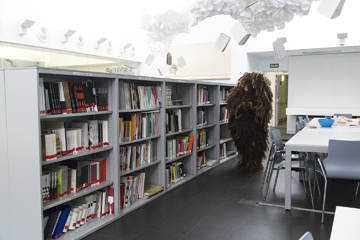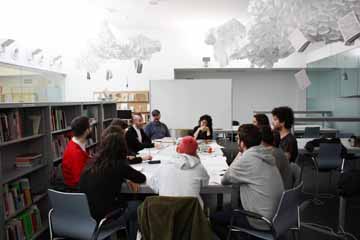The evening we read Delicious Monster, a short story by the Jamaican-born Canadian writer Nalo Hopkinson, we asked the question what does a monster know and what does a monster taste like, and what does it mean to read from knowledge or from taste. We will talk about monsters, birds, demigods, humans, non-humans and plants, like monstera deliciosa which is also known as fruit salad plant, Swiss cheese plant, monster fruit, and balazo, while the Spanish name costilla de Adán compares it with the ribs of Adam. After the session we agreed to exchange cuttings, so that everybody would look after somebody else’s plant at home. This gave rise to gardens and stories. Shortly afterwards we agreed to continue the reading group and fiction. Almost as if we were always dealing with a new cutting, each reading group at CA2M has led to a new experience: from Know Who You’re Dealing With (2014 ̶ 2015) to The Body as Archive (2015 ̶ 2016) and from there to Vaster that Empires and More Slow (2017).
Delicious Monster proposes conversations and readings within the confines of science fiction, terror and fantasy short stories that rethink some of the guises taken by the “monster”, especially those related with women: mermaids, medusas, witches, bearded women, cripples, outcasts... will be the focal point of sessions to think about horror as a landscape of the limits of the known world and to address the monster as a place from which to generate the surprise of the unexpected; to question what does monstrous or horrific mean; to challenge the order that regulates what is natural, normal or strange; to invent other ways of understanding each other. And we will do so through narrations from, among other, Mario Bellatin, Maryse Condé, Edwidge Danticat, Nalo Hopkinson, Ena Lucía Portela, Jean Rhys, Mary Shelley and Samanta Schweblin. Delicious Monster is also an invitation to experiment sensorial and collective ways of reading.
The group is moderated by Tamara Díaz Bringas.
To partake in any session members of the group must have read the texts in advance and attend with a participative attitude.
Enrolment free from 19 September at biblioteca.ca2m@madrid.org
Delicious Monster proposes conversations and readings within the confines of science fiction, terror and fantasy short stories that rethink some of the guises taken by the “monster”, especially those related with women: mermaids, medusas, witches, bearded women, cripples, outcasts...


